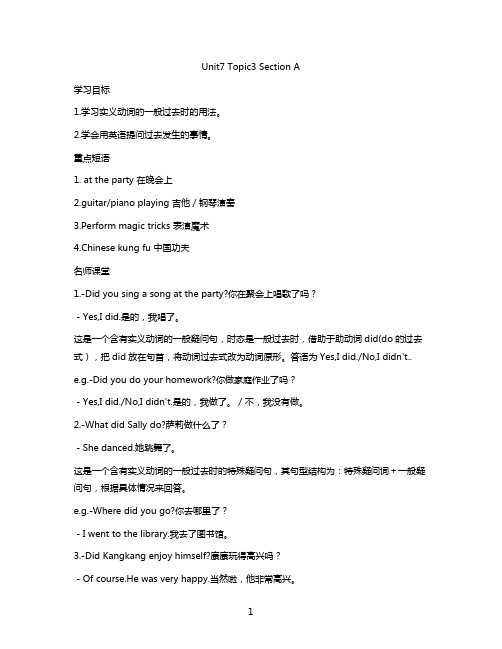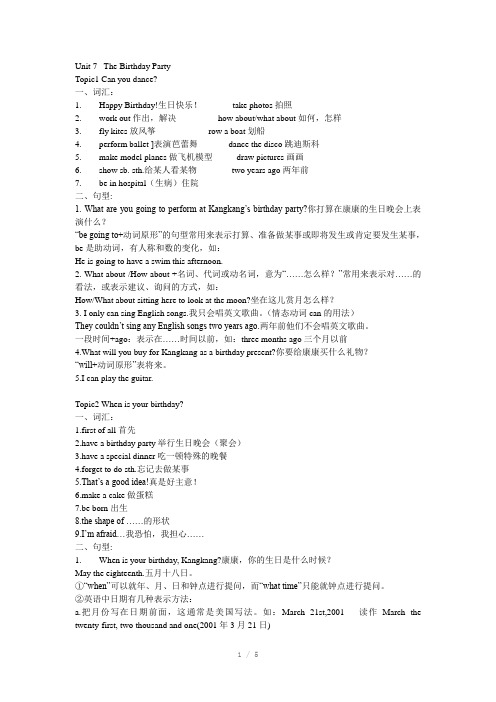知识点七年级英语(仁爱版)下册Unit7Topic3语言点归纳
(完整版)仁爱七年级下Unit7知识点总结.doc

Unit 7Topic11.Happy Birthday! 生日快!2.take photos 拍照3.work out 作出,解决4.how about/what about 如何,怎5.fly kites 放筝6.row a boat 划船7.perform ballet ] 表演芭蕾舞8.dance the disco 跳迪斯科9.make model planes 做机模型10.draw pictures 画画11.show sb. sth.某人看某物12.two years ago 两年前13.be in hospital (生病)住院二、句型 :1.What are you going to perform at Kangkang’ s birthday你打party?算在康康的生日晚会上表演什么?“be going to+ 原形”的句型常用来表示打算、准做某事或即将生或肯定要生某事, be 是助,有人称和数的化,如:He is going to have a swim this afternoon.2.What about /How about + 名、代或名,意“⋯⋯怎么?”常用来表示⋯⋯的看法,或表示建、的方式,如:How/What about sitting here to look at the moon? 坐在儿月怎么?3.I only can sing English songs. 我只会唱英文歌曲。
(情can 的用法)They couldn’ t sing any English songs two years ago两年.前他不会唱英文歌曲。
一段 +ago:表示在⋯⋯以前,如:three months ago 三个月以前4.What will you buy for Kangkang as a birthday present?你要康康什么礼物?“will+ 原形”表将来。
仁爱版英语七年级下册Unit7 知识点整合知识点课件

(2)英式:24th April , 2021(日,月, 年读)作:the 24th of April, two thousand
and twenty-one
4.提问何时出生
-When was/were sb. born?
-I was born in +月份 on +日期
1.What else can you do?
(1)用在疑问词和复合不定代词后 something else/important
(2)other 放在名词前
other people other students
2.确定不确定? of/about sth. 对某事确信
be sure to do sth. 确信做某事
th四加起,八加h,九去e,十二ve 用f 替。 ty先变tie, 最后再加th.
2.序数词前要加the,若有’s/形代则抛弃。
例:the second floor my/Jane’s fifth birthday
3.日期提问
Q1:What’s the date today?
-It’s April 24th, 2021.
1.like doing/to do 2.love doing/to do 3.enjoy doing
have 的过去式:had 17
Part 1 词组速记
2. fall
跌倒
fall down
从...跌落 fall off
fall的过去式:fell
翻译:XYG 刚才摔倒后就开始大哭。
18
Part 1 词组速记
Part 1其他词组知多少
在某人的帮助下 在...岁时 在某人的生日派对上 去年 两年前 在过去
仁爱英语七下Unit7-topic3重要知识点和语法点归纳

Unit 7-The Birthday PartyTopic3 Everyone had a good time。
一、重点短语1. take a walk 散步2.had better 最好3.go out 外出ter on 然后e back to life 复苏6. be busy doing 忙于做某事7.in spring 在春天8.go swimming 游泳9.make a snowman 做雪人10. summer holiday 暑假11. plan to do 计划做某事儿12.go for a walk 出去散步13. be different from 与。
不同st from….to…. 从。
时候持续到st for … 持续多久16.get warm 变暖和17.weather report 天气预报18.learn to do sth 学习做某事儿19..all day 整天二、重点句型1.It’s your turn. 该你了。
turn 是名词,意思是“轮流”轮到某人做某事了。
turn还可以做连系动词,意为“变成……”,后接形容词做表语。
2.We did see a movie. 我们的确看电影了。
(do/did/does +动原表强调)I do think he is right.3. Did Kangkang enjoy himself? 康康玩得开心吗?Enjoy是及物动词,后接名词,代词或是动名词,意为“喜爱,欣赏,享受……的乐趣。
”巧辩异同l i k e,l o v e与e n j o y(1)like喜欢(程度较弱)like doing/to do(2)love热爱(程度较强)love doing/to do(3)enjoy喜爱,欣赏,享受……的乐趣enjoy doing4 . 反身代词oneself变化如下:①第一二人称用形容词性物主代词+self(selves) I→myself you→yourself(yourselves)②第三人称用人称代词宾格+self(selves) he→himself they→themselves5. What happened to Michael at the party? 聚会上迈克发生什么事情了?to是介词to是不定式符号5. I went to the movies with Alice. 在美式英语中,去看电影常用go to the movies在英式英语中,常用go to the cinema 或see a film7. We went to Alice’s home and talked about it until 12o’clock.until在此是介词,后面常接表示某一时间点的名词,它还可以用做连词,后接从句。
七年级英语下册-Unit7综合知识点-仁爱版

七年级英语下册-U n i t7综合知识点-仁爱版本页仅作为文档页封面,使用时可以删除This document is for reference only-rar21year.March七年级Unit 7一、重点单词born adj.出生 June n.六月 March n.三月 April n.四月 May n.五月July n.七月 August n.八月 September n.九月 October n.十月 November n.十一月December n.十二月 January n.一月 thousand num.千 birthday n.生日 celebrate v.庆祝ninth num.第九 twelfth num.第十二twentieth num.第二十 present n.礼物 surprise n.惊奇,诧异;v.使惊奇,使诧异 count v.数,点数 climb v.爬,攀登 anything pron.任何事(物)word n.单词,词;话 mean v. 意思是,意指 recite v.朗读;背诵 poem n.诗magic adj.有魔力的 yesterday n.昨天 happen v.发生 truth n.真相,事实;真理angry adj.愤怒的,生气的 silent adj.无声的 breath n.气息;呼吸 delicious adj.美味的;可口的二、词组例析1.be born 出生。
如:I was born in November,1990.2.have a birthday party (for sb) 为---举行一个生日聚会。
如:My parents had a birthdayparty for me.3.be afraid害怕。
如:I’m afraid he can’t come. / I’m afraid the teacher is angry.4.buy----for---为---买。
仁爱版七年级下册-unit7核心考点归纳

仁爱版七年级下册unit7核心考点归纳【核心词汇】1.afraidafraid是形容词,意为“害怕的,恐惧的”。
常和系动词一起构成系表结构。
句式be afraid是afraid最常用的形式,其常见的用法有:(1)be afraid ofbe afraid of后跟名词、代词或动名词,意为“害怕某人或某物”。
例如:Are you afraid of dogs?你害怕狗吗?She seems very much afraid of him.她好像很害怕他。
He is afraid of j umping.他不敢跳。
(2)be afraid tobe afraid to后接动词原形,意为“害怕做某事或不敢做某事”。
例如:He is afraid to fly in a plane.他不敢坐飞机。
2.ago&before(1)ago表示“从现在起的若干时间以前”,意思是“距今......以前”,需和过去时或过去进行时连用。
before泛指“从过去起的若干时间以前”,意思是“距过去某时以前”,常和完成时连用,尤其在间接引语中,例如:His parents died ten years ago.他父母十年前都去世了。
He said that his parents had died ten years before.他说他父母亲十年前都去世了。
I have never been there before.我以前从来没有去过那里。
(2)如果不具体表明多少时间以前,只用before不用ago,意为“从前、以前”。
before仍以副词的形式置于被修饰语后,常与完成时或者过去时连用。
例如:Have you seen this film before?你以前看过这部电影吗?He asked me whether I had been to the Great Wall before.他问我以前是否去过长城。
(3)表示在某一点时间或事件以前时,只用before不用ago,这种用法是将before 当作介词或连词使用。
仁爱版英语七年级下册Unit7Topic3 知识点归纳

Unit7 Topic3 Section A学习目标1.学习实义动词的一般过去时的用法。
2.学会用英语提问过去发生的事情。
重点短语1. at the party 在晚会上2.guitar/piano playing 吉他/钢琴演奏3.Perform magic tricks 表演魔术4.Chinese kung fu 中国功夫名师课堂1.-Did you sing a song at the party?你在聚会上唱歌了吗?-Yes,I did.是的,我唱了。
这是一个含有实义动词的一般疑问句,时态是一般过去时,借助于助动词did(do的过去式),把did放在句首,将动词过去式改为动词原形。
答语为Yes,I did./No,I didn't..e.g.-Did you do your homework?你做家庭作业了吗?-Yes,I did./No,I didn't.是的,我做了。
/不,我没有做。
2.-What did Sally do?萨莉做什么了?-She danced.她跳舞了。
这是一个含有实义动词的一般过去时的特殊疑问句,其句型结构为:特殊疑问词+一般疑问句,根据具体情况来回答。
e.g.-Where did you go?你去哪里了?-I went to the library.我去了图书馆。
3.-Did Kangkang enjoy himself?康康玩得高兴吗?-Of course.He was very happy.当然啦,他非常高兴。
(1)enjoy doing sth.喜欢做某事,享受做某事的乐趣。
(2)enjoy oneself=have a good time 过得愉快,玩得高兴。
oneself 为反身代词。
Unit7 Topic3 Section B学习目标1.继续学习实义动词的一般过去时。
2.掌握有关责备的句子,鼓励学生做一名诚实的孩子。
重点短语1.fall down 摔倒2.hurt oneself 伤着某人自己3.at once 立刻,马上4.This way,please 请往这边走5.have a good/great time 玩得很高兴6、next time 下次名师课堂1.-What's the matter?怎么啦?-I missed the chair and fell down.我没坐到椅子上,摔倒了。
仁爱英语七年级下册Unit7要点归纳

Unit 7 The Birthday PartyTopic1 Can you dance?一、词汇:1. Happy Birthday!生日快乐!take photos拍照2. work out作出,解决how about/what about如何,怎样3. fly kites放风筝row a boat划船4. perform ballet ]表演芭蕾舞dance the disco跳迪斯科5. make model planes做飞机模型draw pictures画画6. show sb. sth.给某人看某物two years ago两年前7. be in hospital(生病)住院二、句型:1. What are you going to perform at Kangkang’s birthday party?你打算在康康的生日晚会上表演什么?“be going to+动词原形”的句型常用来表示打算、准备做某事或即将发生或肯定要发生某事,be是助动词,有人称和数的变化,如:He is going to have a swim this afternoon.2. What about /How about +名词、代词或动名词,意为“……怎么样?”常用来表示对……的看法,或表示建议、询问的方式,如:How/What about sitting here to look at the moon?坐在这儿赏月怎么样?3. I only can sing English songs.我只会唱英文歌曲。
(情态动词can的用法)They couldn’t sing any English songs two years ago.两年前他们不会唱英文歌曲。
一段时间+ago:表示在……时间以前,如:three months ago三个月以前4.What will you buy for Kangkang as a birthday present?你要给康康买什么礼物?“will+动词原形”表将来。
仁爱英语七年级下册Unit7Topic3知识点总结+练习

Every one had a good time.'、教学内容、重点短语at the party 在派对上 perform magic tricks 表演魔术fall dow n 掉下,落下,摔倒,倒塌 hurt on eself 伤了某人自己lots of= a lot of 许多 make sth. by hand 亲手做 blow out 吹灭二、重点句型Did you sing a song at the party? Yes, I did./ No, I didn 'Did you sing a Chin ese song or an En glish song? An En glish song. 3. What ' the matter?4. What time did you come back home last ni ght?二、 ^4言点1 Did Kangkang enjoy himself?康康玩得开心吗?Enjoy 是及物动词,后接名词,代词或是动名词,意为“喜爱,欣赏,享受 ”的乐趣。
”enjoy on eself = have a good/great time 玩得愉快 enjoy doing sth. 喜欢做某事巧辩异同 like, love 与 enjoy (1)like 喜欢(程度较弱)like doing/to do⑵love 热爱(程度较强)love doing/to do(3)enjoy 喜爱,欣赏,享受 ,,的乐趣enjoy doing2.反身代词on eself 变化如下:①第一二人称用形容词性物主代词+self(selves)I T myself you 宀 yourself(yourselves) ②第三人称用人称代词宾格+self(selves) he ^ himself theythemselves四、重点语法---行为动词的一般过去时1. 否定句:didn '+动词原形女口: Jim didn ' t go home yesterday.一般疑问句:在句首加did,句中的动词过去式变回原形。
- 1、下载文档前请自行甄别文档内容的完整性,平台不提供额外的编辑、内容补充、找答案等附加服务。
- 2、"仅部分预览"的文档,不可在线预览部分如存在完整性等问题,可反馈申请退款(可完整预览的文档不适用该条件!)。
- 3、如文档侵犯您的权益,请联系客服反馈,我们会尽快为您处理(人工客服工作时间:9:00-18:30)。
Unit 7 Topic 3I 重点词汇和短语did, recite, poem, magic, enjoy, himself, yesterday, fall, wash, happen, stand, video, lie, truth, angry, each, everyone, silent, blow, breath, sunny, delicious, funnyenjoy oneself, at once(=right now), come back, video game, tell a lie, blow out, fall down, hurt oneself, lie to sb. ,tell the truth, mak e…by hand, make a silent wish, in one breathII 语言点Section A1. perform ballet , dance the disco , recite a Chinese poem, at the party, magic tricks2. You speak Chinese very well.well 副词, 在这修饰动词speak. He does well in his English.作形容词时作身体好: — How are you? — Very well.3. Did Kangkang enjoy himself ?enjoy 喜欢enjoin +sth.喜欢某物He enjoyed English.enjoy +doing sth. 喜欢做某事I enjoying playing basketball.enjoy + oneself =have a good/nice/wonderful time过得高兴,玩得开心We enjoyed ourselves yesterday.=We had a good time yesterday.4.It’s your turn . 该轮到你了。
turn在此用作名词,表示“依次轮到的机会”。
常用的结构有It’s one’s turn to do sth.该某人做某事了a) It’s your turn to clean the classroom. 该轮到你打扫教室了。
take turns to do sth.轮流做某事b) We take turns to clean the classroom.我们轮流打扫教室Section B1.What’s the matter?=What’s wrong? = What’s up? 怎么了?(什么事?)2. I missed the chair and fell down. 我没坐到椅子,摔倒了。
miss 在这里有“错过”的意思fall down摔倒3. Did you hurt yourself? 你伤到你自己了吗?hurt adj. (身体上)受伤的v. 伤害;受伤;感到疼痛hurt oneself伤了某人自己4. Go and wash them at once.and在这里表并列关系,前后两个动词形式要一致at once = right now立刻,马上5.What happened to Michael at the party? Michael 在聚会上怎么了?happen to sb.(事件)发生在某人身上a) I want to know what happened to Jane.我想做的Jane发生了什么事What happened to sb./sth.某人/事怎么了?相当于What’s the matter with sb./sth.或What’s wrong with sb./sth.6. How could you lie to me? 你怎么能欺骗我呢?这是表示责备和抱怨的句子。
文中表示责备的句子还有:Why did you come back so late? 你为什么回来得这么晚?Why didn’t you tell me the truth?你为什么不对问说实话呢?lie to sb.=tell a lie to sb.向某人说谎a) Don’t lie to your parents.tell sb. the truth.向某人坦白,跟某人说实话b) You should tell the police the truth if you do know.7. We did go to the party. 我们确实参加晚会了。
本句中did 是助动词,用于过去时态的句子中。
而一般现在时则用do 或does。
其本身没有实际意义,用在实义动词前,以加强句子的语气。
如:I do think he is right. 我确实认为他是对的。
She does like Japanese. 她的确喜欢日语。
8. It made her father very angry 这使得她爸爸非常生气make sb./sth. + adj.使得某人/物…be angry with sb.对某人生气be angry at sth.对某事生气Section C1.His parents bought lots of food and drinks for us. 他父母给我们买了许多食物和饮料。
food在此用作不可数名词,表示食物的总称。
当drink表示不同种类的饮料时可以加s。
buy sb. sth. = buy sth. for sb.为某人买某物2. Each of us gave Kangkang a birthday card, too. 我们每个人又送给康康一张生日卡片。
each of us意为“我们每个人”。
⑴each of/ each one of / every one of 后接复数名词或代词,作主语时,谓语动词通常用单数。
如:Every one of them is going to plant trees. 他们每个人都打算去植树。
⑵each,every“每一个”each表示一定数目中的每一个,强调个人或个别。
指两者或两者以上中的每一个。
a) E ach student is here.每个学生都到了every表示数目不确定的许多人或物中的每一个,强调整体。
指三者或以上中的每一个b) Every student is here.所有的学生都到了3. We made the cards by hand. 我们亲手制作了卡片。
by hand (靠)手工mak e…by hand 手工做……4. We all sat around the cake. 我们都围坐在蛋糕旁。
sit around 围着……坐5. Kangkang made a silent wish, and then he blew the candles out in one breath.康康默默地许了一个愿,然后一口气吹灭了蜡烛。
make a wish 许愿in one breath 一口气(做完)blow the candle out= blow out the candles吹灭蜡烛6.He was very funny.他非常有趣funny adj.滑稽的,有趣的相当于interestingfun n. 玩笑,乐事have fun in doing sth.玩得高兴Section Dis/am ----was are----were stand------stood do----did sing----sang fall----fell go----went forget---forgot come----came get----got tell----told make----made have/has----had think----thought lose----lost buy-----bought bring----brought give-----gave sit----- sat blow-----blewIII 语法1、行为动词的一般过去时⑴. 一般过去时结构1). 肯定句: 主语+谓语动词的过去式+其它, 谓语动词不随人称的变化而变化。
She saw a film last week.2). 否定句:主语+didn’t +动词原形+其它。
He didn’t have breakfast this morning.3). 一般疑问句: Did + 主语+ 动词原形+其它?简单回答: Yes, 主语+did. / No, 主语+ didn’t.Did you go to the zoo last Sunday?Yes, I did./ No, I didn’t.4). 特殊疑问句: 疑问词+ 一般疑问句?What did you do yesterday?⑵. 用法1). 表示过去的动作或存在的状态Kangkang had a birthday party last Friday.2). 表示过去连续发生的动作He went home and sat down.⑶一般过去时常见的时间状语(标志词)last+week/month/year/--- , 时间段+ago, at the age of+数字,when---was---years old, yesterday, just now, a moment ago等2、动词过去式的规律:①一般情况v+ed . 如:play —played, perform —performed②以不发音的e结尾的+d . 如:dance —danced, recite —recited③以辅音字母+y结尾的,变y为i+ed. 如:carry —carried, study —studied, worry —worried④末尾只有一个辅音字母的重读闭音节词, 先双写辅音字母, 再加ed . 如:plan —planned , stop —stopped⑤不规则动词的过去式参见课本P142.⑥(读音)清辅音后读/t/ , 元音、浊辅音后读/d/, /t/ /d/ 后面读/id/IV 重点句型及交际用语1. ---Did you sing a song at the party? ----Yes, I did.2. ---What did Sally do? ---She danced.3. He performed some magic tricks.4. It’s your turn.5. ---What’s the matter? ---I missed the chair and fell down.6. ---Poor Michael! Did you hurt yourself? --- No, I’m OK.7. ---Where is the washroom, Kangkang? ---This way, please.8. What time did you come back home last night, Judy?9. How could you lie to me?10. Why did you come back so late?11. Why didn’t you tell me the truth?12. Kangkang made a silent wish, and then he blew the candles out in one breath.13. Thank you for your birthday card.V 课本作文范文P75Dear Lulu,How are you?Thank you for your birthday card. We had a wonderful party at my home yesterday. And I got lots of presents.Jane played the guitar and Maria played the piano. We danced, sang songs and played games at the party. The music was good and the food was delicious. We all had good time.Best wishes,Kangkang附:不规则动词分类记忆表1、只改变动词的原音字母begin —began drive —drove blow —blew come —came drink —drank ride —rode grow —grew sing —sang give —gave shine —shone know —knew run —ransit —sat write —wroteswim —swamget —got draw —drew hang —hungforget —forgot fall —fell hold —held2、只改变动词的辅音字母make —made send —sent spell —spelt spend —spent 3、动词原形与过去时相同cost —cost fit —fit hurt —hurt let —let put—put read —read 4、动词的过去式以ought或aught结尾buy —bought think —thought bring —broughtteach —taught catch —caught5、在原单词后加一个辅音字母burn —burnt learn —learnt mean —meant hear —heard6、去掉一个元音字母meet —met speed —sped7、其它stand —stood take —took can —couldsleep —slept keep —kept leave —leftbe —was/were do —did eat —ate find —foundfly —flew go —went have —had lie —laylight —lit lose —lost say —said see —sawspeak —spoke tell —told wear —wore。
